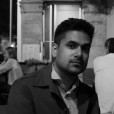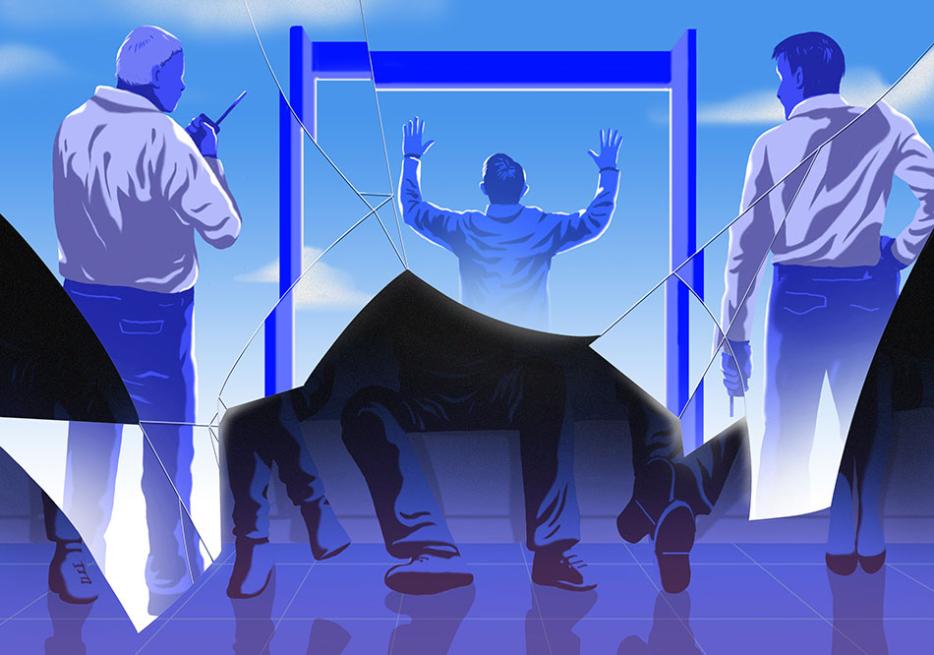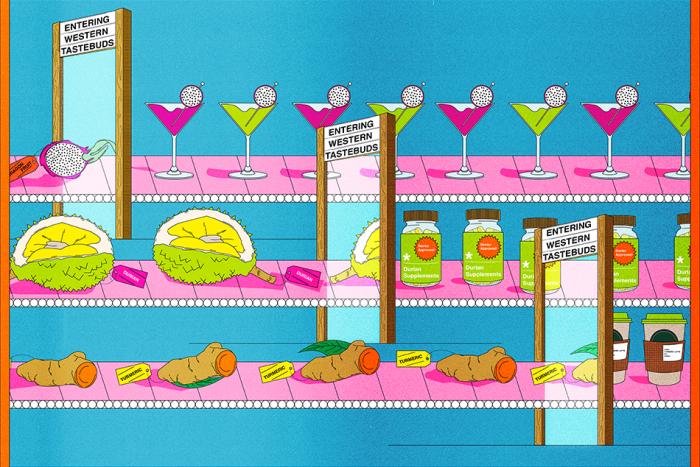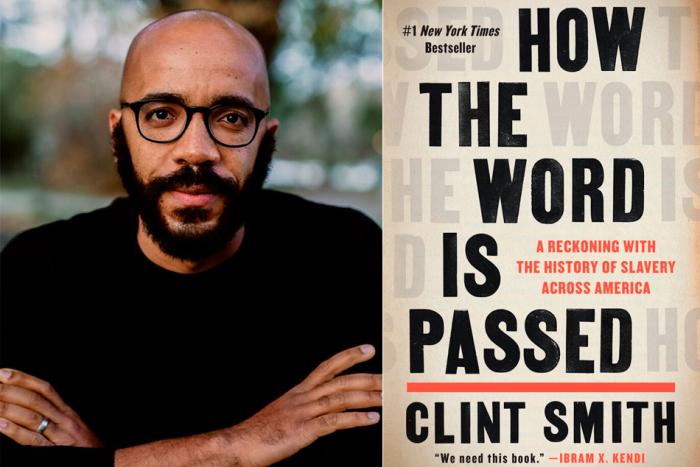Certain stories are for wielding, not telling. I used to have one before it was taken away.
It was more of a joke, a few lines of generic airport experience and television borrowings honed into a minor weapon for use in business situations. But I counted on it. The final time I used it was at the AAP Conference in October 2018. Seven listeners and I were on a sickle-shaped couch in the lobby of a generic hotel implanted into the superstructure of a retired castle in Montreal. The couch was upholstered in washable light gold fabric that rasped against pants and skirts and felt like Kevlar against my palm as I pushed myself deeper into the cushion, hoping to discover a secret angle or groove free of the rigid springs that were pressing into my tailbone.
“I don’t blame them, I’d pat me down too. I am always, no exception, late to the airport, sweated up when I get there. The air conditioning freezes it on my face and gives me that hospital or strapped-with-plastique sheen. Then there’s the whole ‘this’ thing.”
I added, as I did every time, to the invitation of my smile with an up-down displaying wave of hand over face. The downstroke acknowledged the skin that caused the airport situation and the unease of my listeners. The upstroke, a toss like I was flinging salt or a spell, dismissed any tragic significance, sent race into the ether, let my listeners join in a laugh if they were brave enough to start it.
Anyone who takes pleasure in rendering even brief power from goodwill and fear is shit. When I used this story, I was no exception. I want to make it clear that I understand this, and that it doesn’t prevent me from discerning that Olivia Robinson was and is much worse than I am. She’s also, in the sense that matters to her and to our world, much greater.
The six listeners who weren’t Olivia reacted exactly as I wanted them to. Mouths balanced between self-evaluating smile and moue of concern, quickly hidden by a mug or glass held up like a quivering masquerade visor, eyes shy to meet mine and saturated with a compassion begging for transmutation into accepting, accepted laughter. The features of these people have vanished now, from AAP’s offices and from my memory. Eye colour, ruddiness, dental details—all gone. Enough of them were white for me to have deployed the story, remarkable considering the company’s diverse employee pool, which Nena Zadeh-Brot called a “rainbow whirlpool of mediocrity blending into a calming diarrhea tone when stirred with the correct human resources stick.” I only remember that they were watching me correctly, that they were doing what I wanted them to do.
But Olivia Robinson just looked like me. Her expression. She looked like the person telling, not the person listening. Her appearance, classed by Nena as “tolerable Aryan prettiness,” has nothing in common with my aging Indian softness, other than the strip of upper gum we now both reveal when we speak. I say “now” because this first meeting took place during Olivia’s closed-mouth speaking period, when her lips only allowed the occasionally flickering sight of tongue against darkness, never a gap or archwire or elastic or point of enamel. And now that she’s speaking with her new mouth, with its perfect teeth, I’m in recession. If I still spoke to people and cared about how I presented, I’d have to reprogram myself to talk through the same flat pucker she mastered. As my gums retreat and blacken, the teeth look like they’re growing into my head, as though they mean to bite my brain, also shrinking and darkening in its nervy membrane pouch.
“What about the power of it, though?”
“Of what?” I scratched my thumbnail against the cushion just in front of my crotch, then turned the motion into a brush at the immovable pills on the knees of my suit pants, in case anyone thought I’d been subtly gesturing toward my dick. Olivia saw the gesture, and beyond it. I am myself when I’m inside a doubt.
“In the airport. Instead of feeling abject, targeted—which, totally, I understand you are—what about feeling how scared of you people are? Isn’t it powerful that there are spaces in this world where you’re not you, but a menace? No one’s ever scared of me.”
None of the others saw how much smarter she was than me, and I hadn’t yet understood, either. But I did feel it. Olivia played it perfectly to look like she had no sense of humour, which people are always ready to believe about a person like her. Perhaps it is true in her case, but she at least has a sense of senses of humour, or she wouldn’t know when people hope she will laugh, and that would be too great a tactical weakness.
I couldn’t see how this exchange benefitted Olivia until the next day, when she allowed me to know. But I did understand that it had been fair to rob me of my pathetic charge of control.
The drinks in our group’s hands were appropriate to an early afternoon with two conference sessions left before dinner—coffees, sodas. Olivia had a lemonade. She was younger than me, perhaps twenty-seven to my thirty-eight. I chewed ice. My story died, not because Olivia had exposed it, but because she had begun to consume it, at the outset of a long game that began when she indicated a pretend path to power on that acrylic couch.
I’m going to try to avoid making these pronouncements with the false sense of distance and ironic knowingness I want to slip into. The truth is that my airport story’s morsel of leverage was meaningful to me, and I was sad to lose it. I’m still sad about it. Sad that I am a person who wants a tool like this, sad that I no longer have it.
As I mentioned, no one else in my audience for this impromptu conference-adjacent seminar on race and terror still works for AAP. In pursuit of the ideal of efficiency that our leadership requires, and with any of the many who have attempted to form a union paid off or terminated long before their organizing can come to term, there is a lot of churn. It’s painful, because AAPers are hired for their devotion, their programmability, their willingness to pronounce their liberal arts degrees both useless and crucial, their servitude to the ideal of technology making knowledge masterable and advancing education beyond the cave. When AAP leaves these employees behind, they are so completely indoctrinated that they are cut off from their pasts. They can only move on to one of AAP’s lesser competitors, begin doomed start-ups, or fling themselves into the pensioned, shutting maw of university administration.
After Olivia routed me, I left the lobby and skipped the afternoon session. This was still possible before the enforced scans that were instituted at the January 2019 AAP Edu-Jam. A point of AAP structure that we present to clients as proof-of-efficiency is that there are only ever 100 upper-level employees. Thus, there should be exactly 100 people in the room at every central AAPC presentation. When we talk up this streamlined aspect of our business to schools, we’re very careful not to let them think we’re critical of their own inflating administrative position numbers. The more people clustered at the broadening top over there, the better chance that one of them will subscribe to AAP. The suggestion is that we stay lean so they don’t have to.
I went to four used bookstores and one bar. There, I laid out the books I’d bought on the artificially distressed but genuinely beer-stained table in front of me and took a photo to post in the near future, when none of HR’s freelance social media hawks could make the connection between my browsing time and absence from Dr. Bobby Merchant’s “Your New Paperless Memorybank: A Digital Communications Action Intensive” seminar. My co-workers would be repeating to Dr. Bobby, who had been an early champion of AAP at our crucial first two Ivy League scores, that his product wasn’t a shockingly obsolete rehash of the Palm Pilot and that the stylus was indeed an essential and neglected connectivity tool. Dr. Bobby had retained enough money and influence for his irrelevance to be denied in every zone of his life except the market. He constantly mistook me for an AAP programmer named Amandeep who’d been deported months earlier, two days after the FBI came to our offices for his hard drive. Amandeep wasn’t deported, really: he flew home with a cousin’s passport to avoid prison or ICE detention. The cousin was then deported. My superiors didn’t tell me to accept Dr. Bobby’s ongoing error, but it was made clear that I should prevent him from feeling embarrassed, or worse, asking what had become of Amandeep. Dr. Bobby presented with that tech mogul eyebrowless squint and isosceles lip-purse that suggested an unattackably itchy anal contusion caused by excessive scratching. I wanted to spend my afternoon looking for modern firsts, for J.G. Farrell and V.S. Naipaul, and so I did. I would post the photo and the prices I’d paid two weeks after the conference and a fellow collector in Devon would call me a lucky cunt in genuine rage, and I would feel happy. I drank three beers, ate two dinners, and waited until midnight to come back to the hotel with my books and bottles. Nena was only a couple of floors away, but hadn’t messaged me all day, which wasn’t unusual when we were about to see each other.
*
The next morning, Olivia apologized for being insensitive.
She was ponytailed and her clear eyes spoke of at least a decade of sobriety, disciplined sleep and exercise. I was sure she’d spent the morning in the hotel’s gym or pool, while I roiled the sheets and coughed into consciousness. Perhaps forty other AAPC attendees could hear me forgiving her repeatedly, in a voice I had to drag from hungover glottals into the precise, gracious speech that Olivia knew I was capable of if only I tried. Nena Zadeh-Brot was across the lobby, speaking to two AAP board members and pointing at an iPad, but also watching me. We wouldn’t speak until after the sessions were over, but her glance pulled me out of the final lingerings of sleep, forcing me entirely into conversation with Olivia Robinson, to witness the creation of repentance as product, to contain the apology that was being forced into me.
“It’s totally okay. I feel embarrassed you’ve even been thinking about this, truly.”
The lobby smelled of fresh tile adhesive, except when a guest disobeyed the signs to use the revolving doors and let in a gust of October wind cool enough to have an immediate freshening effect, even if it was polluted. But I stayed lodged in the smell of my own head, its plaque and necrotic mucous and trapped air. From Olivia came an insistent scent of pennies and mint.
“No. Osman, I know nothing of your past, of you, except what I can see and imagine. And that I—that I just interrogated you like that, told you how to process your own experience like I had any conception of what it is to live even a moment in your skin—it would be like, oh, Jesus, it would be like you telling me how I should fucking deal with PMS.”
“It would not—I didn’t see it that way at all. We were two grown-ups talking about ideas, which is always okay.”
It is not okay, especially at AAPC, but I was too disoriented to figure out how to claw this remark back. Olivia didn’t lean in, but her right forefinger, a questing E.T. digit with a bumblebee-yellow manicure, landed at the apex of my shoulder, the place where the hollow between muscles would be if I had a proper body.
“I’m sorry. Please feel that,” Olivia said. Her expression hadn’t changed, but the eyes were clearer, wider, the pupils refracting with dark sincerity. The crowd of forty was quiet. Even the people who were speaking left pauses long enough to take in what Olivia was saying. And while I understood exactly what she was doing, finally, while I knew that she was speaking past me to an audience, that she always would be, she still made me want to try to live up to her earnestness in that moment. How the fuck does that work?
That exchange is only remembered by Olivia and me, except in the subconscious of every man and woman who’d seen me dominated with such ease. It is generally forgotten because Olivia made herself unforgettable moments later by hijacking AAPC’s keynote presentation, dominating a stage she wasn’t even standing on, and reducing the speaker and anointed next leader of our organization, Elodie Chan, to just another audience member.
Planted questions are part of the house style of an AAPC presentation. Every session has to come in at under twenty-five minutes, including Q & A. This time-efficiency is also part of AAP’s public face. Part of what we offer to colleges and universities is a guarantee to increase potential enrolment by packaging their existing lecture and seminar offerings as compressed online-delivered courses with an optional in-class supplement, an offering that we assured the schools was “just as beneficial to end-users,” leaving out the statistic that somewhere under 17 per cent of enrolled students actually viewed and completed the entire online package. But the profit stats and test cases were undeniable. Tuition income rose by the millions at each of our four pilot schools, and AAP’s earnings swelled on our 5 per cent ask in return for upfront-costless implementation and administration of the program. The inescapable five-year contract for sign up had been conceived of and written by Nena Zadeh-Brot in conjunction with two long-vanished members of the legal department; Nena had taken an enormous bonus instead of a promotion after its successful implementation. That’s when the board knew she planned to leave AAP, someday, and she was never offered a promotion again. 2019 was Nena’s planned final year, in fact, but only our end-to-end encrypted chat knew that. I wasn’t ready to escape so soon, but was naturally unremarkable enough to avoid offers of promotion.
That same quality kept me safe from being asked to be a question-plant at AAPC. Olivia Robinson was assigned to raise her hand in minute seven of Elodie Chan’s keynote, which would end up being her last as VP, two months before her total release from the company. A particular trick of Elodie’s was to avoid cramming in prepared questions at the end. She had them peppered throughout, so she could hit minute twenty-five with a judicious wrap-up that included everything that the audience had brought to the idea. It was a reusable innovation: simulated dialectic fit the AAP tradition. It was an organized display that we could replicate and use in sales pitches out in the field. During Elodie’s wireless-mic-and-chin-thrusting speech, her arms ran through a sequence of four postures—summoning, inquiring, pensive, embracing—that she had memorized because her instinct was to leave them hanging apelike at her sides. Her set-up to the fatal question was: “What can we tell these institutions of higher learning that they’re all, from Sunnydale Polytechnic to fucking Cambridge,”—Elodie paused for the laugh here, as the top reaches of AAP were expected to display frankness and practicality by swearing in their presentations—“what can we tell them that they’re, without exception, doing wrong?”
She pointed at the person who was about to depose her. Olivia rose from her middle seat in the second row and stumbled over the first set of knees she encountered, laughing at herself for the rest of her trip to the mic in the aisle.
“I can’t believe I’m about to make a serious statement to y’all when I can barely walk.” The “y’all” sounded so wrong in her mouth I wondered if it was a bit of Swedish until I figured it out.
“Please, go ahead,” Elodie said. Olivia had eaten perhaps forty unplanned seconds, and Elodie’s arms assumed their natural slaughterhouse dangle as she mentally cut sentences from her remaining time.
“Elodie’s asking us what the schools are doing wrong, and I totally see the value in that. Absolutely. But—and I’m sorry—I just don’t think it’s the question we need to be asking right now. In this company, in this world. We need to be asking what we’re doing wrong.”
The tremor of a hijack in progress passed through the room, as tangibly as if the aisle Olivia was standing in was airborne and she’d stepped into it with a clever wood-and-rubber gun. Elodie could edit, but she couldn’t improvise. Her jaw hung open a half inch, matching her slack arms perfectly. We all saw it. She fixed the mouth but the arms stayed.
“And I think that how we choose the questions we ask is exactly the issue,” Olivia continued. “Who we think of as our customers, as our clients—that’s the issue. How limited our idea of inclusion is. That’s the issue.” The mic was cordless, and Olivia had silently unholstered it from its stand and turned, started to back up with perfect smoothness. She moved slowly. If you were sitting, and not exactly in line with her at the back of the room, as I was, the glide to being flush with the stage would have looked like a wedding or funeral procession: dramatic, inevitable, ending in the right place. The movement made the stage, and certainly Elodie, invisible. Even the camera tracked down to record Olivia, leaving Elodie as a pair of calves ending in grey heels, the gradual zoom briefly revealing a scuff that looked like a wad of white gum on the tip of the left toe.
“End-user is such an impersonal term, but that’s what we have to think about. It’s what our clients, the schools, think about. The students. That’s ultimately who we work for, am I right? And what we’re leaving out is their humanity. That’s what we are doing wrong. I am so guilty of this myself, and I know it resonates for a lot of people in this room.
“Connection is what we sell. Accelerated connection, yes, but in order to be accelerated it has to be deep, profound, immediate, true connection. Do we really understand how valuable what we’re doing is? We are the only company in the world that is both mining and enriching the same resource: students. Young humanity.”
I cannot express to you how well this went over, and how well it still does—a combination of disingenuous self-criticism and laudatory descriptions of our mission. Now that Olivia was up there, everyone in the room collectively realized that this was one thing, one essential thing, that Elodie Chan sucked at. She didn’t know how to take the right shallow dips into shame and corporate self-interrogation to illuminate the glory of AAP’s path forward. This was a crucial sales and motivation tool that no president could be without. Elodie’s career ended right then, but Olivia continued with another few strophes on students, and then a transition that included my name.
“Osman—is it Shah? Could you please stand? God, I didn’t even have the—I really hope I got your last name right.” She blinked self-consciously, the eyes closed for an extra moment of penance. There was a gathering of flesh around the mouth in her otherwise sharply cut face, a poised cluster of skin that suggested the protrusions her braces were correcting. Olivia summoned me to stand, looked for me in the crowd instead of behind it. I walked a few steps forward and waved, then receded back to the wall. Elodie watched me as though I were advancing with a rifle and her blindfold had slipped slightly.
“Osman was telling me—telling us—a story yesterday, about his mistreatment at the airport. He couched it in humour to make us all comfortable, but it was just so clear—this was, this is, a person who deals with daily humiliations on a scale that I can’t even contemplate, and comes to his colleagues with the expectation that for us to be open to his emotional state, he has to entertain us with his despair.
“This is a man who carries the certainty that even AAP, with our perfect diversity statistics, can’t be a home for his pain, unless he smuggles it in under his labour and good-hearted humour. We need to ask what we are doing wrong. We need to ask: are we really valuing diversity? Are we channelling the fullness of the experience of our Osmans—I see your faces now in this crowd as I admit I never have before—if all we’re asking is for you to help us with specific sales strategies, and not to come to us with all of your experiences, freely and with openness and the expectation of understanding? Are we working with you or just using your work?”
I watched her subsume my story, annex it to her ongoing enlightenment narrative, a grander tale that she was offering AAP the chance to be part of. I’ve since read my first name twice in interviews with her, an altered telling of my tangle with security now embedded in her pruned and arranged answers about diversity, power, grace. This is the real reason I don’t tell that story anymore: it’s not that I saw the truth of what a manipulative turd I was when I told it, but because Olivia liked what I said and decided to take it away and make it useful. Now I can’t take it back without being correctly accused of theft, because she did more with that airport scenario than I ever did.
While AAPC applauded, and Elodie waved redundantly behind her, Olivia Robinson unfurled a hand toward me, as though she had manifested the brown lump of tragic heroism who was leaning against the wall to take pressure off his shitty spine with its slight curve and two herniated discs. The audience turned to applaud the person who had been conjured for them. Randall Dunn, the biometrics chief analyst who worked in the chair next to mine, mouthed an apology to me as he shook his head. Our obviously curry lunchtime bit died forever that day.
Olivia’s move to topple Elodie would have been laughably obvious if she hadn’t made laughter impossible by hiding the coup in an apology. The audience accepted her bid at concealment. They saw the attempt but also the quality of its packaging, and they allowed that exterior to become the reality. It’s the reaction they would hope for if they ever strategized assassination plans of their own. They would want their goodness to be believed, their ambition ignored. No matter what came to pass in the year after that summit, Olivia will always be fond of me, because her gambit worked. And Elodie, long absent from AAP, is rumoured to have died of the big flu or to be running a non-profit. It’s generally agreed that she moved to Denmark.
Excerpted from A Hero of Our Time by Naben Ruthnum (McClelland & Stewart).






